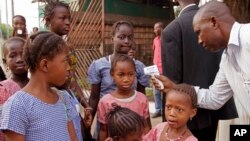The World Health Organization says many Ebola survivors are left with physical and psychological problems, and will need help to recover from the debilitating aftereffects of the virus.
Meeting at WHO headquarters in Geneva on Friday, clinicians and experts involved with the outbreak in West Africa considered best-care practices for current patients and explored follow-up treatment for survivors.
A key finding was that Ebola victims anywhere in the world have a better chance of survival if they receive very good care, including intravenous fluids and other symptomatic treatments. Fatality rates at good treatment centers in West Africa have dropped as low as 25 percent, the WHO group said, close to those in the United States and Europe, around 22 percent.
The experts also said seeking early treatment for Ebola, good hygiene and better communal practices contribute to improved survival rates, and they emphasized the need for increased attention to caring for pregnant women and children, who are most vulnerable to the deadly illness.
Representatives were on hand from Liberia, Sierra Leone, Guinea, along with the Democratic Republic of Congo and Uganda, which both have had long experience with the disease.
WHO technical adviser Margaret Harris says children under 5 have a very high mortality rate — up to 90 percent for infants younger than one year, and that the current standard of care for children is not working and must be changed.
“[The high mortality rate] was often because they need a great deal of support — to be fed, to be cared for," she said. "And there was quite some suggestion that simply being separated and isolated, as happens in an Ebola treatment unit, had a devastating psychological effect on children. They did not have parents, they did not have carers. There have been some approaches encouraging survivors to take the role of carers, with adequate prevention — infection prevention — control measures.”
She also said the experts are greatly concerned about the well-being of people convalescing from Ebola, and that survivors continue to have physical problems, including muscle and joint pains, headaches, vision problems and psychological distress.
“The psychological problems are more, maybe, due to post-traumatic stress disorder, but they may be due to a number of other things, and they range tremendously," she said. "So there is a huge need for ongoing care of people who have recovered from Ebola. There is a need to have such people on registries, so that they can be followed up. There is a particularly important need to follow up children who have been infected with Ebola and recovered, because we do not know whether this will have any effect on their neurological development and other development."
The experts say the so-called “no-touch approach” to treating Ebola victims has to go, since health-care workers must be in physical contact with Ebola patients to provide the best clinical care. However, that does not mean any change in protection for caregivers, who must continue to wear personal protective gear, including gloves, to resist infection by the virus.







